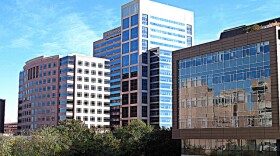With a vibrant live music scene, a bustling tech sector and a top-flight university, Austin seems like an oasis for young people.
However, the seemingly youthful Texas capital isn't wasted on the young.
The Austin-Round Rock area has the fastest growing population of people between ages 55 and 64, and the third-fastest growing for those 65 and over, according to U.S. Census data.
An organization called Power for Parkinson's is offering those affected by the disease a chance to step forward into an active, healthy life.
There are plenty of dance classes in Austin, but you've surely never seen one quite like this: Everyone is sitting down, lifting their arms and tapping their feet — with some sort of restrictive movement, but they're smiling and laughing. Welcome to Power for Parkinson's.
Nina Mosier, a co-director of Power for Parkinson's, is a retired physician who has spent a lot of time with Parkinson's patients. But when her father was diagnosed with Parkinson's, she decided to found the group in Jan. 2013.
Since then, Mosier says, over a hundred people have come through the program and many have stayed with Power for Parkinson's. The group's growth is understandable — 50,000 to 60,000 people are diagnosed with the disease every year, and over a million are living with the disease. And the disease has become a growing problem among younger and younger people in the past few years.
Power for Parkinson's offers free class that address physical symptoms and effects through activities such as dance classes and activities that look to combat symptoms that, for some, can be debilitating.
"You know, you don't feel good and, so, you don't want to do anything," says John Thompson, who was diagnosed four years ago. "I've always been very athletic and it's just really hard to get up and do something."
While Thompson may consider himself athletic, he certainly doesn't consider himself a dancer.
"Just ask my wife," he says. "What I do on the dance floor doesn't even resemble dancing. But, you know, we're doing 'Singing in the Rain' and it's a performance. And you have an umbrella and it seems so silly — particularly for somebody like me whose always kind of been sort of macho. But it's just so much fun. It affects your mind and your body — the music, the movement."
Dancing reinforces the mind-body connection that's sometimes lost or compromised among Parkinson's patients, helping to improve balance, motor skills and neuroplasticity. Mosier says dance can prevent, or sometimes even reverse, symptoms of Parkinson's.
Classes are also designed for another purpose: social engagement.
"It's fun doing it, but I believe that the biggest benefit from Power for Parkinson's is that the exercise is almost secondary to the social," says Michael Rhea, whose wife Nancy was diagnosed with Parkinson's over 10 years ago. That social aspect, Rhea says, has helped his wife battle the depression that followed her diagnosis.
"We went through quite a funk about having Parkinson's," Rhea says. "And a lot of people do. But through Power for Parkinson's, and other organizations like them, we were able to pull ourselves, you know, out of that and put ourselves in a position of being able to give back."
But there is a give-and-take in organizations like Power for Parkinson's. While Nancy and Michael are inspired by others, they, in turn, inspire others, proving life doesn't end with a Parkinson's diagnosis.
"We are celebrating our 40th wedding anniversary, and we've made a commitment to go to Hawaii," says Nancy who, with Michael, has been going on bike rides with her husband everyday. "So, every day when we get out and go bike ride, I can visualize Hawaii. So, it's kind of exciting. Thirty-six miles doesn't seem like much, but when you have Parkinson's, wow, you're going somewhere."




